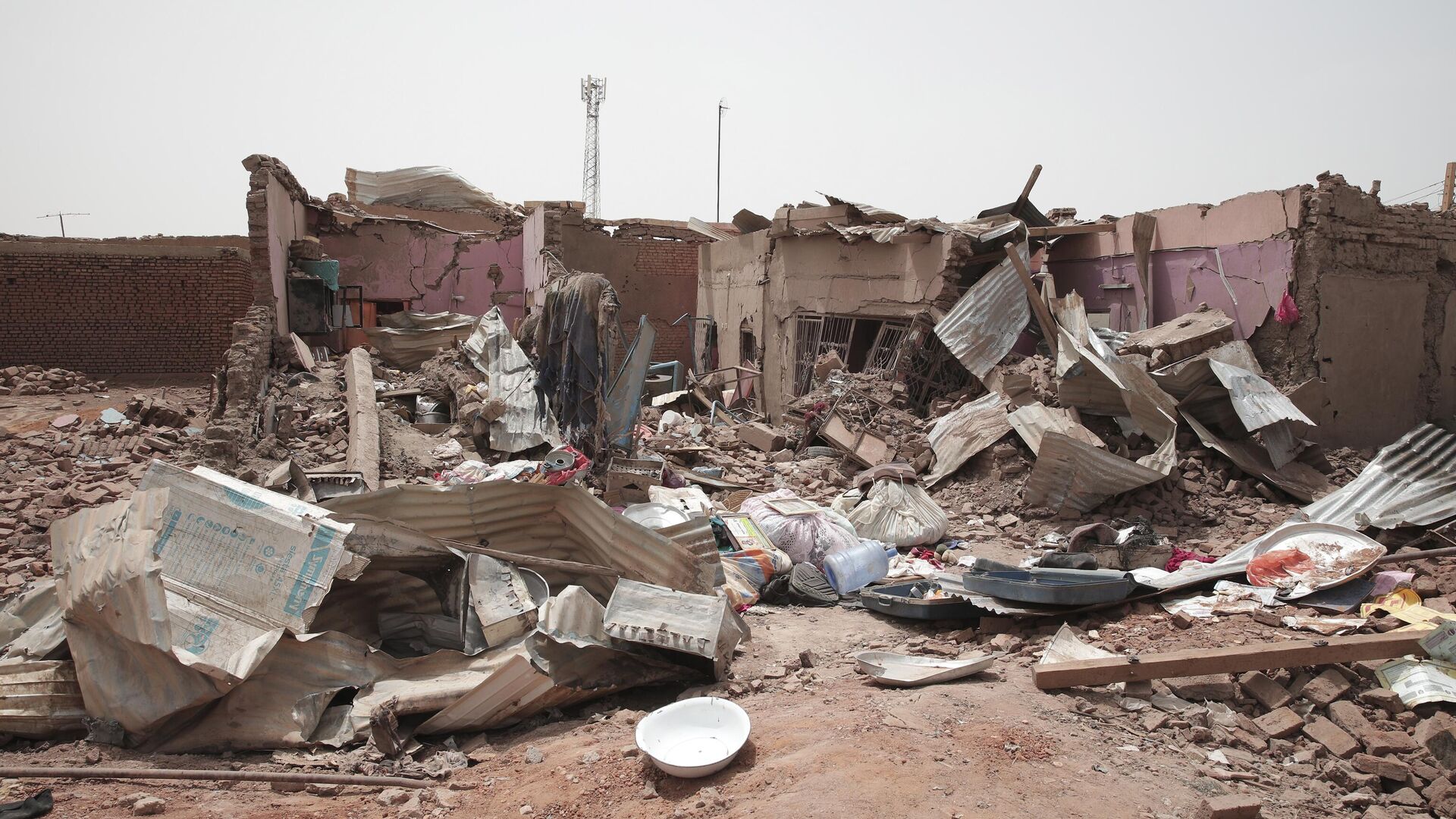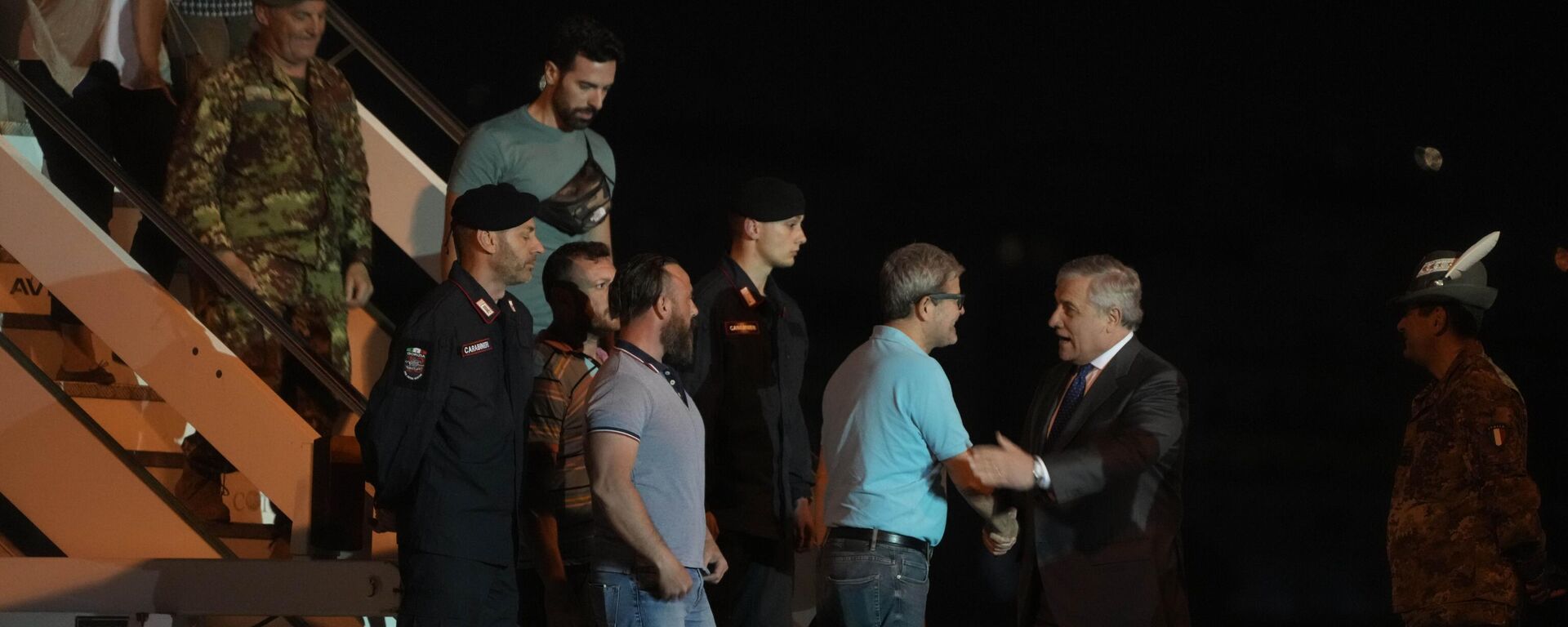https://en.sputniknews.africa/20230425/who-warns-of-high-risk-of-biological-hazard-after-fighters-seize-sudanese-lab-1058845114.html
WHO Warns of 'High Risk of Biological Hazard' After Fighters Seize Sudanese Lab
WHO Warns of 'High Risk of Biological Hazard' After Fighters Seize Sudanese Lab
Sputnik Africa
There is a "high risk of biological hazard" after one of the warring parties seized a laboratory holding measles and cholera pathogens in the Sudanese capital Khartoum, the WHO announced on Tuesday.
2023-04-25T17:20+0200
2023-04-25T17:20+0200
2023-05-03T12:54+0200
sudan
armed clashes in sudan
north africa
rapid support forces (rsf)
world health organization (who)
united nations humanitarian office (ocha)
https://cdn1.img.sputniknews.africa/img/07e7/04/19/1058847544_0:160:3072:1888_1920x0_80_0_0_0f47aebfe5d5af04cafaccd75ec48b31.jpg
There is a "high risk of biological hazard" after one of the warring parties seized a laboratory holding measles and cholera pathogens, in addition to other hazardous materials in the Sudanese capital Khartoum, the World Health Organization (WHO) announced on Tuesday. The armed clashes between the Sudanese military and the Rapid Support Forces (RSF) paramilitaries have left roughly 459 people dead and 4,072 injured, said Nima Saeed Abid, a WHO representative in Sudan, noting that technicians were unable to access the Sudanese National Public Health Laboratory to secure the materials. The WHO’s statement comes as the conflict between the Sudanese Army and the Rapid Support Forces, which erupted in Khartoum on April 15, carries on.At the time when the conflict erupted, the sides were trading accusations over who shot at whom. The army attacked the positions of the special forces, some of them were claimed by the Sudanese military to have been taken under control. Later, the leadership of the armed forces announced the dissolution of the Rapid Support Forces, refusing to negotiate with them.Amid the clashes, the United Nations humanitarian office (OCHA) was forced to suspend some of its activities in several areas of Sudan. At least five aid workers have been killed since the armed conflict broke out and the two UN agencies who lost staff, the International Organization for Migration and the World Food Program, suspended their activities, according to Reuters.Earlier today, a newly-agreed-on 72-hour truce took hold. The last time, the sides agreed to a temporary ceasefire related to the Muslim holiday of Eid al-Fitr, which was on April 20.The truce is seen by observers as necessary, among other things, so that the Sudanese, who have been trapped in their homes for several days since the onset of the hostilities, can get out of the country's capital.Meanwhile, a growing list of countries have evacuated diplomats, staff and others from Sudan, as the fierce fighting rages on in the country's capital.
https://en.sputniknews.africa/20230425/sudanese-military-rsf-agree-to-72-hour-ceasefire-as-foreign-evacuation-of-diplomats-continues-1058835218.html
sudan
north africa
Sputnik Africa
feedback@sputniknews.com
+74956456601
MIA „Rossiya Segodnya“
2023
Sputnik Africa
feedback@sputniknews.com
+74956456601
MIA „Rossiya Segodnya“
News
en_EN
Sputnik Africa
feedback@sputniknews.com
+74956456601
MIA „Rossiya Segodnya“
Sputnik Africa
feedback@sputniknews.com
+74956456601
MIA „Rossiya Segodnya“
high risk of biological hazard in sudan, what is hapenning in sudan? rapid support forces, foreign countries evacuate diplomats from sudan
high risk of biological hazard in sudan, what is hapenning in sudan? rapid support forces, foreign countries evacuate diplomats from sudan
WHO Warns of 'High Risk of Biological Hazard' After Fighters Seize Sudanese Lab
17:20 25.04.2023 (Updated: 12:54 03.05.2023) Over the past 10 days, the capital Khartoum and other Sudanese cities have borne the brunt of clashes between Sudan's national army and the Rapid Support Forces (RSF). As the fighting rages on, a slate of foreign countries, including Venezuela, Canada and Turkiye, has begun evacuating their diplomatic personnel.
There is a "high risk of biological hazard" after one of the warring parties seized a laboratory holding measles and cholera pathogens, in addition to other hazardous materials in the Sudanese capital Khartoum, the World Health Organization (WHO) announced on Tuesday.
The
armed clashes between the Sudanese military and the Rapid Support Forces (RSF) paramilitaries have left roughly 459 people dead and 4,072 injured, said Nima Saeed Abid, a WHO representative in Sudan, noting that technicians were unable to access the Sudanese National Public Health Laboratory to secure the materials.
"This is the main concern: no accessibility to the lab technicians to enter to the lab and safely contain the biological material and substances available there," he stated, without specifying which side of the warring parties made the seizure.
The WHO’s statement comes as the conflict between the Sudanese Army and the Rapid Support Forces, which erupted in Khartoum on April 15, carries on.
At the time when the conflict erupted, the sides were trading accusations over who shot at whom. The army attacked the positions of the special forces, some of them were claimed by the Sudanese military to have been taken under control. Later, the leadership of the armed forces announced the dissolution of the Rapid Support Forces, refusing to negotiate with them.
Amid the clashes, the United Nations humanitarian office (OCHA) was
forced to suspend some of its activities in several areas of Sudan. At least five aid workers have been killed since the armed conflict broke out and the two UN agencies who lost staff, the International Organization for Migration and the World Food Program, suspended their activities, according to Reuters.
Earlier today, a newly-agreed-on 72-hour truce took hold. The last time, the sides agreed to a temporary ceasefire related to the Muslim holiday of Eid al-Fitr, which was on April 20.
The truce is seen by observers as necessary, among other things, so that the Sudanese, who have been trapped in their homes for several days since the onset of the hostilities, can get out of the country's capital.
Meanwhile, a growing list of countries
have evacuated diplomats, staff and others from Sudan, as the fierce fighting rages on in the country's capital.


